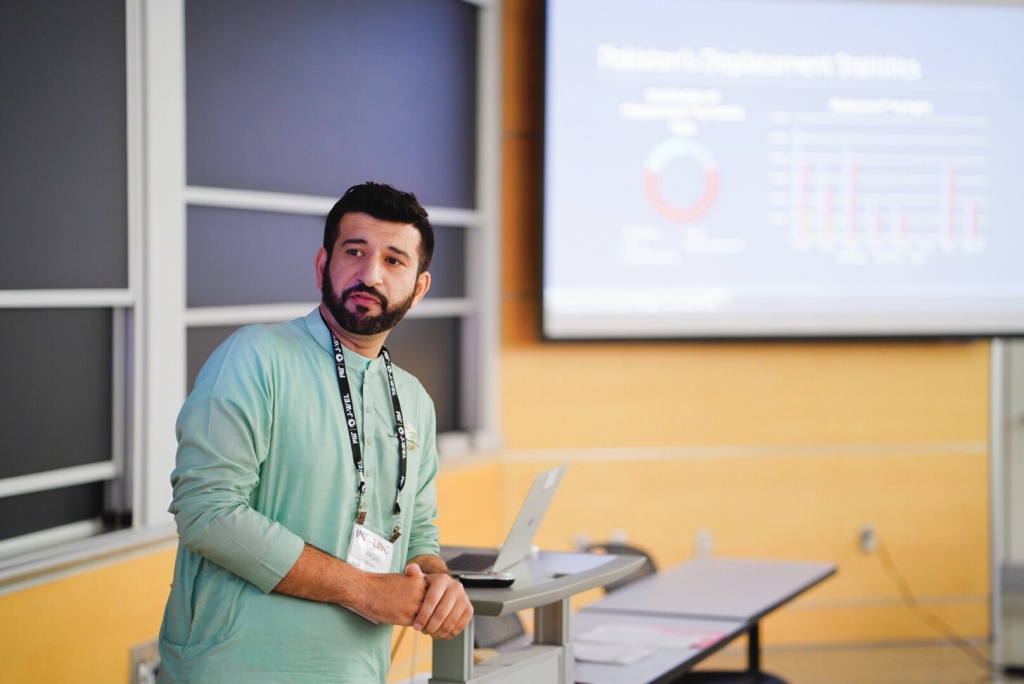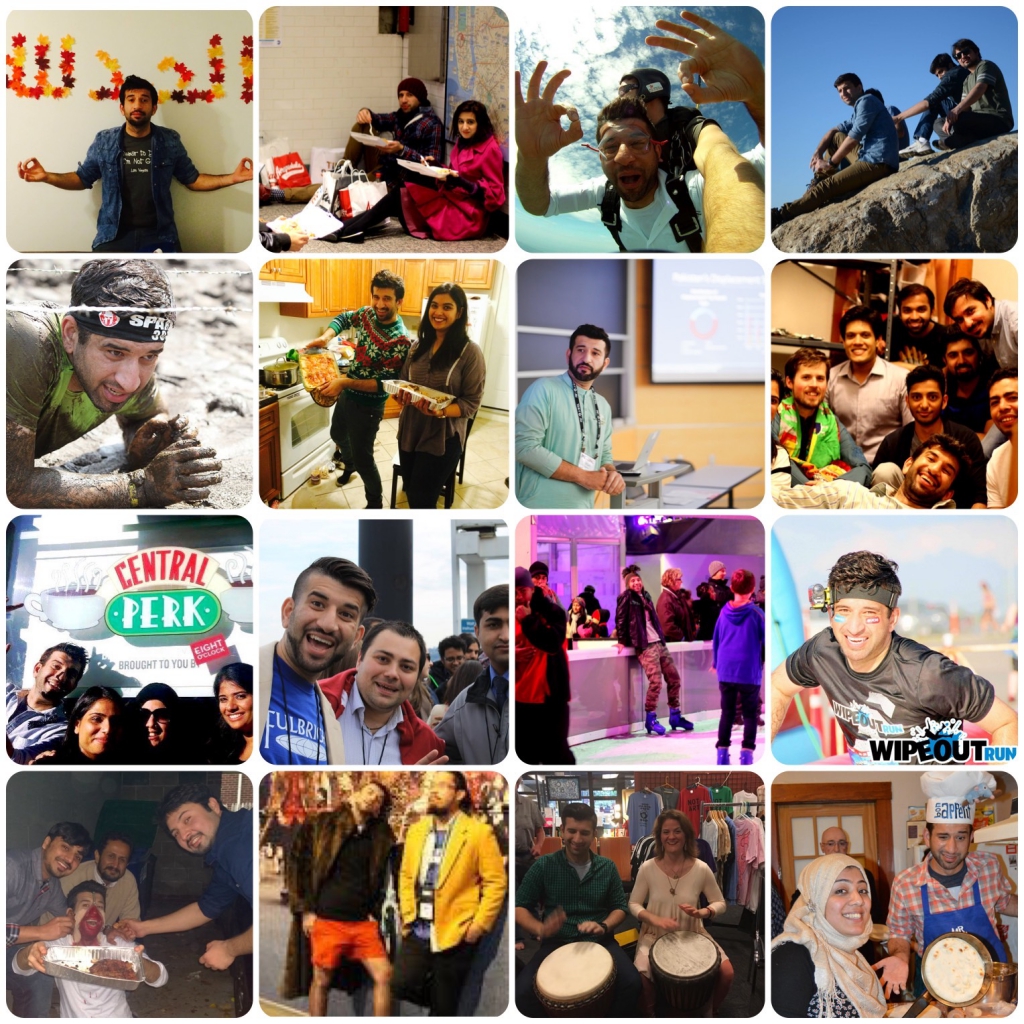
We recently spoke to Waqas Idrees, a young energy expert, about his Fulbright experience, his professional trajectory, and so much more.
What led you to apply for the Fulbright Program?
During my undergraduate studies, I was unable to attend my dream school due to limited finances, so I enrolled in a newly founded school. However, after graduating, I was rejected and often ridiculed at job interviews for having gone to a ‘non-brand’ school. This certainly wasn’t a morale booster at the start of my professional life!
I realized what I needed was exposure and decided to pursue a master’s degree. My mother, a staunch supporter of quality education and a believer in self-reliance, encouraged me to pursue a master’s abroad. However, since my parents could not bear the finances of an international degree, she encouraged me to apply for the Fulbright scholarship. (Here, I need to highlight the importance of attending educational expos, often scoffed at by undergraduate students for being a waste of time. They really do help!)
My resolve was tested once again when I applied for the Fulbright program. I was turned down not once, not twice, but three times. However, patience and persistence won in the end, and I secured the prestigious scholarship on my fourth attempt, making me the first alumnus from my school to get it.
Tell us more about your academic experience as a graduate student at Northeastern University (and also at MIT for electives).
I went to the U.S. to study energy systems from the lens of policy reforms and regulations. At Northeastern, I studied under Dr. Gregory Kowalski, an eminent professor in the field of mechanical engineering, and at MIT, I studied ‘Engineering, Economics, and Regulation of the Electric Power Sector’ under Dr. Ignacio J. Pérez Arriaga, who has played a monumental role in the liberalization of the electric power sector of the European Commission and Latin America. Under their guidance, I was able to critically analyze Pakistan’s power sector and determine the barriers in switching to more sustainable options.
During this time, I was also lucky enough to get an opportunity to work professionally even though I had not applied for internships. It turns out that my professor had forwarded my resume, with the highest recommendation, to a headhunter. I seized the opportunity to work at Schneider Electric, a multinational company providing energy and digital automation solutions for efficiency and sustainability. It proved to be the perfect bookend to my academic training of the previous two years. I was later offered a full-time position at the company but turned it down to return to Pakistan.
Here, I want to highlight an important point: hard work and dedication always pay off. Based on my work ethic, my professor recommended me for a potential position without my knowledge. Later, my supervisor at Schneider Electric offered me a full-time job at the end of my internship. There is a reason why America is called the land of opportunity. You only need to prove your worth for opportunities to come knocking at your door.

Fulbright: An experience like no other.
Can you share a memory that stands out in your Fulbright journey?
Saying that it is hard to choose one memory feels like a cliché, but it’s true. From doing the Spartan and wipeout runs to skydiving from 10,000 feet, from cross-country road trips to volunteering with the Islamic Center in Boston, there are innumerable memories I can pick. For now, let me share two that stand out.
The first one is where it all started. I have always been spontaneous, and planning for two years of study was no different. I went to the U.S. without finalizing an accommodation and ended up staying at Boston Logan airport for three nights. I would lug around my bags across the city to find housing, only to come back to Logan at the end of the day to spend the night.
The second memory I want to share is of the ‘Boston dinner parties’, as we termed them, which were spread over two years. I love to cook and was affectionately called Zubaida Apa (the beloved Pakistani chef) in the Fulbright circle. For Fulbrighters, it became somewhat of a rite of passage to eat at my place when in Boston. From iftars to Thanksgiving and Christmas dinners, we did it all and had a blast while doing it!
How has your time in the United States impacted your professional/personal journey so far?
The Fulbright scholarship gave me the perfect canvas to explore the many facets of my personality. The myriad of experiences I had in the U.S. – from leadership courses and professional challenges to rigorous academic investigations – all prepared me to work in the energy sector in Pakistan.
In addition to this, I was also able to refine the solution to a social problem that I had been observing growing up: access to education. UNICEF estimates that 22.8 million children are out of school in Pakistan. To do my part, I would offer free classes to underprivileged children in my neighborhood, even though the gesture often felt pointless because of its limited geographic reach. Then, when I had to take online lectures during Boston’s infamous blizzard, I truly began to appreciate the potential of digital learning. Upon returning to Pakistan, I conducted two pilot studies on digital learning’s efficacy in educating underprivileged children. The results for both studies were overwhelmingly positive and presented at MIT’s LINC 2016 and 2019 conferences. In a world altered by Covid-19, the real impact of these studies became even more apparent, and researchers from all over contacted me to discuss adapting the findings for their regions.
You recently participated in USAID’s Sustainable Energy for Pakistan (SEP) project. Can you briefly tell us about the goals of the project, your contribution and the benefits to Pakistan?
The four-year multimillion-dollar project supported Pakistan in increasing the financially sustainable delivery of energy services to aid the country’s economic and social development. SEP consisted of four technical components, each with its multidisciplinary team of international and local consultants and technical experts. I was the co-lead for the component responsible for increasing private sector investment in clean energy projects. Other components focused on transmission, distribution, and governance.
My engagement with the SEP project allowed me to contribute to Pakistan’s energy sector at a national level. As the co-lead for the generation task, I worked with Amin Lakhani, one of the best technical minds. Together, we facilitated the financial closing of 12 wind and four solar power projects that will provide 860MW of renewable energy for Pakistan’s national power grid. This represents a private and public sector investment of $922 million in clean energy projects, which is a huge achievement and sends a positive message globally that Pakistan is open for business. My team also assisted the government with designing a competitive procurement process for renewable energy generation, which will serve as the foundation for renewable energy auctions in the future.
Any advice for future/returning candidates who want to become positive agents of change like yourself?
I believe mine is a story of grit, discipline, and perseverance. I now use my accumulated experiences to mentor students through workshops, motivational talks, and career counseling sessions. Therefore, my first advice is to have complete and unwavering trust in God as you work towards your goals. Do not doubt yourself, even if you are failing. My second piece of advice is to rise beyond yourself and support others around you. It doesn’t necessarily have to be grand gestures of altruism. It can be as small as giving water to a parched animal or spending quality time with your loved ones. People often try to connect their purpose of existence with goal-based achievements, but this Buddhist quote is how I see it:
“Your problem is that you equate your purpose with goal-based achievement. The universe isn’t interested in your achievements… just your heart. When you choose to act out of kindness, compassion, and love, you are already aligned with your true purpose.”